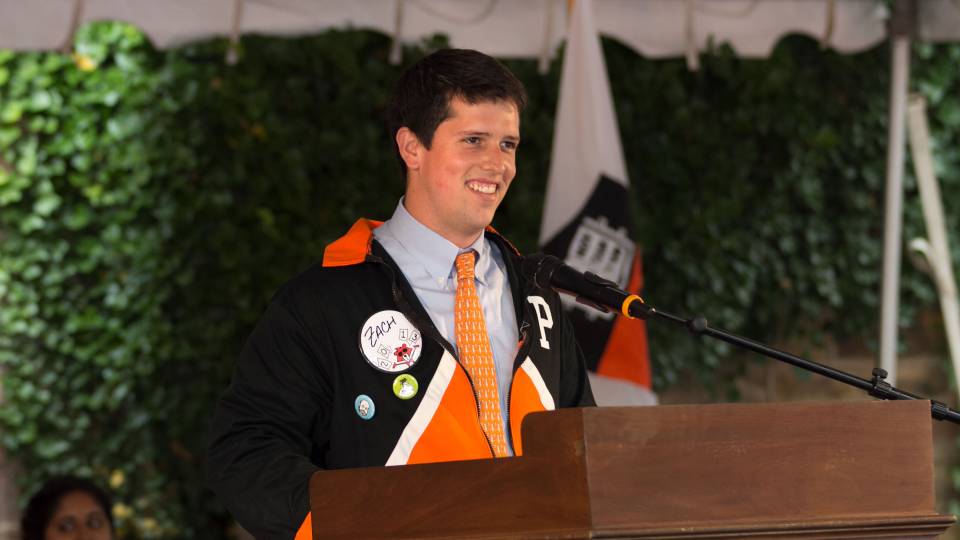His 1988 Pulitzer Prize-winning book, "Battle Cry of Freedom," has become the classic text on the Civil War, and now James McPherson has a new book out that focuses on a single battle of that war. "Crossroads of Freedom: Antietam" tells the story of the battle of Antietam, the bloodiest day of the Civil War, in which more than 6,000 soldiers were killed. The war was at a crossroads as the soldiers met in the fields between Antietam Creek and the Potomac River on Sept. 17, 1862. When the Union emerged victorious, the course of the rest of the war was determined.
McPherson, the George Henry Davis '86 Professor of American History, "does a superb job of re-creating a moment when the war, and all of American history that followed, might have gone altogether differently," said a review in USA Today.
In between appearances to promote the new book, McPherson is working on a new edition of "Battle Cry of Freedom" with 700 new illustrations, set to be published in December 2003. And he is putting the finishing touches on "Hallowed Ground: A Walk at Gettysburg," a short book in a series about places that are meaningful to the author. In addition, McPherson recently was named the 2003 president of the American Historical Association. This semester he is teaching his popular "The American Civil War and Reconstruction" course.
The Civil War scholar talked to the Princeton Weekly Bulletin about what would have happened if the South had prevailed at Antietam, what lessons from that battle are instructive today and how he has tried to humanize the image of Abraham Lincoln.
You've written about so many aspects of the Civil War. Why the battle of Antietam?
I've long been convinced, ever since I started trying to put together the multiple layers of Civil War history -- the military, the political, the social, the diplomatic -- Antietam was a turning point on all those levels. No other single battle in the war had such multiple consequences.
And yet Antietam is less well-known than, say, Gettysburg, or the combination of Gettysburg and the surrender of Vicksburg, which happened at virtually the same time, as a crucial battle of the war. I thought it would be a good idea to enlighten readers on the importance of this battle.
You discovered in researching the book that public opinion underwent lots of dramatic shifts during the war.
What surprised me the most was the volatility of public morale in both the North and the South, the mood swings in response to the fortunes or misfortunes of their armies. During the early months of 1862, when Union armies won a string of victories, euphoria set in in the North: "The war's going to be over by May 1st. We're going to win this war by the Fourth of July." And there was real despair and depression in the Confederacy. And then it turns around 180 degrees after a few Confederate victories.
So by the eve of the battle of Antietam, when Lee invades the North, despair is widespread in the North: "The war is lost. The United States is going down the tubes." And even more than euphoria, a kind of arrogance creeps into Southern public opinion: "These Yankees, we always knew we could whip 'em, and we got 'em on the run now!" And then it all turns around again in Antietam. This fever chart of public opinion, which was expressed by newspapers, letters and diaries kept by ordinary people, is really quite remarkable, and it shows the extent to which support for a war effort really depends on how well the war is going.
You've said understanding history helps understand the present and the future. Are there any lessons from Antietam that are relevant today, as we think about going to war with Iraq?
I think so. I think if -- and it is still a big if -- we engage in some kind of military activity in Iraq, as long as it goes well, the public will support it. But if it looks like it's not going well, or it's costing more in lives and resources than the objective might be worth, as in Vietnam, public opinion can turn against it pretty quickly. Nothing succeeds like success in military events, and nothing fails like failure. It's probably more extreme than any other sphere of life.
The full interview is available in the Weekly Bulletin.
Contact: Lauren Robinson-Brown (609) 258-3601





